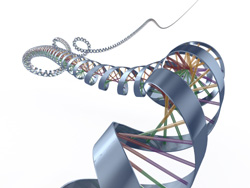Gaining insight into hyperthermophile DNA
The EC-funded REPBIOTECH project concentrated on shedding light on every aspect of DNA replication, including the enzymatic apparatus that is utilised during replication. In depth investigations aimed at elucidating all aspects of the replication process could reveal new insights at the genetic as well as protein level. Project partners at the Karolinska Institute studied the hyperthermophilic microorganism Pyrococcus abyssi. Due to their ability to live and survive in extremely high temperatures their molecular biology poses special interest to scientists. For normal monocellular forms of life, the temperatures at which Pyrococcus abyssi lives and replicates would mean instant death and of course DNA denaturation. The study of the enzymatic complex associated with DNA replication in Pyrococcus abyssi revealed a series of novel interactions as well as peptides. Scientists focused on elucidating the crystal structure of the mini chromosome maintenance (MCM) complex as well as of the DNA nuclease enzyme. These new developments in the area of DNA replication research provide new avenues for growth for the industrial applications field and also the pharmaceutical community. This line of research could indeed prove to be the first in a series of new-generation DNA replication inhibitors against a number of pathologies.



